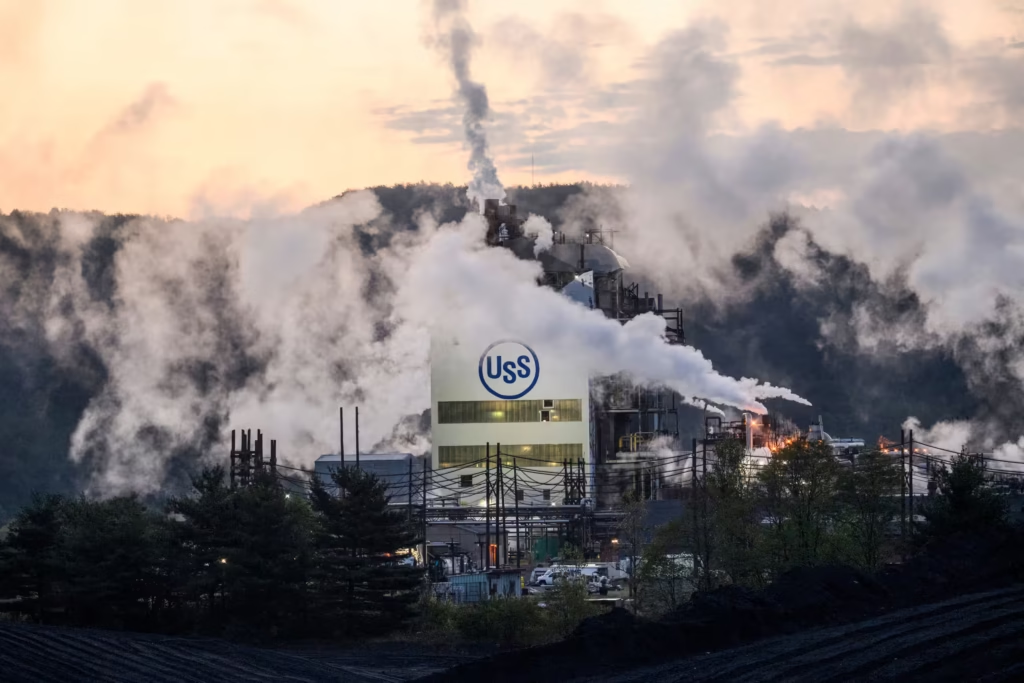
Steelworkers in Pennsylvania are reeling after President-elect Donald Trump announced he would block the $14.9 billion sale of U.S. Steel to Nippon Steel, a Japanese company, proving once again that campaign promises are just promises with extra glitter.
Trump, the self-proclaimed savior of American manufacturing, took to Truth Social to flex his foreign-deal-blocking muscles, writing, “I am totally against the once great and powerful U.S. Steel being bought by a foreign company, in this case Nippon Steel of Japan. Through a series of Tax Incentives and Tariffs, we will make U.S. Steel Strong and Great Again, and it will happen FAST! As President, I will block this deal from happening. Buyer Beware!!!”
While Trump was pounding his keyboard in all caps, steelworkers in Pittsburgh, a city where U.S. Steel employs 3,500 people were left scratching their hard hats.
The proposed sale, which Nippon had pitched as a lifeline for the industry, promised $2.7 billion in investments, advanced technology, and get this – job security.
But instead of a sigh of relief, steelworkers got Trump’s version of a business plan: tariffs, vague tax incentives, and a big helping of nostalgia for an America that never actually existed.
Steelworkers: “Gut punch? Try sucker punch”
Jason Zugai, vice president of United Steelworkers Local 2227 in West Mifflin, summed up what everyone in Pittsburgh was thinking: “For me, yeah, very frustrated with the news that came out last night. I didn’t expect that to come out, so that was like a gut punch.”
Zugai’s reaction might resonate with the same steelworkers who rolled out the red carpet for Trump during his campaign.
Back in October, the union sang his praises, calling him a hero for imposing tariffs that supposedly saved their jobs.
Richard Tikey, another local union VP, called Trump’s past efforts “a once-in-a-lifetime experience,” adding that it was about giving his members a chance to meet the man who “saved us all.”
Fast forward to now, and those same steelworkers are wondering if they were played.
Nippon: Investing in jobs, not hashtags
For the record, Nippon Steel wasn’t exactly planning a hostile takeover. Their deal included a promise to pump $2.7 billion into U.S. Steel’s unionized facilities, introduce state-of-the-art technology, and secure jobs for American workers, according to The Guardian.
In fact, Mayor Chris Kelly of West Mifflin called the plan a “no-brainer.”
“The people that own and operate Nippon Steel are the real deal,” Kelly told Newsweek.
“A billion-dollar investment that creates 5,000 additional jobs over a period of four to five years … it produces a better outcome. You’re going to employ more people, you’re going to use more American products. I mean, it’s a no-brainer.”
But in Trump World, where foreign companies are automatically suspect, Nippon’s billions might as well have been Monopoly money.
Instead of looking at the numbers, Trump decided to roll out his greatest hits: nationalism, tariffs, and cryptic warnings like “Buyer Beware!!!”
The opposition: Big talk, little trust
Of course, not everyone in the steel industry is thrilled about the sale.
United Steelworkers President David McCall isn’t exactly handing out trust falls to Nippon executives. He told WTAE, “I don’t trust them. And more than that, the fact that they’re spending billions—or millions and millions of dollars in P.R. campaigns, as opposed to answering the needs of our members, concerns us a lot.”
McCall isn’t alone.
Senator Marco Rubio, who has somehow stayed relevant long enough to become Trump’s nominee for secretary of state, warned earlier this year that the deal could pose national security risks.
Apparently, nothing says “bad for America” like advanced manufacturing jobs and foreign investment.

A breakup in the making
The irony here? Many of the steelworkers now fuming over Trump’s decision were the same people cheering him on just months ago. They bought the campaign slogans, believed the promises, and thought they had found a champion for their industry.
Now, as Trump prepares to block a deal that could inject billions into their communities, they’re left wondering if they backed the wrong horse or rather, the wrong caps-lock enthusiast.
As for the rest of us, let this be a lesson: when someone promises to “make [anything] great again,” it’s always worth asking, “For who?”





